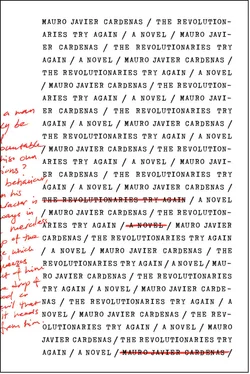Mauro Cardenas - The Revolutionaries Try Again
Здесь есть возможность читать онлайн «Mauro Cardenas - The Revolutionaries Try Again» весь текст электронной книги совершенно бесплатно (целиком полную версию без сокращений). В некоторых случаях можно слушать аудио, скачать через торрент в формате fb2 и присутствует краткое содержание. Год выпуска: 2016, Издательство: Coffee House Press, Жанр: Современная проза, на английском языке. Описание произведения, (предисловие) а так же отзывы посетителей доступны на портале библиотеки ЛибКат.
- Название:The Revolutionaries Try Again
- Автор:
- Издательство:Coffee House Press
- Жанр:
- Год:2016
- ISBN:нет данных
- Рейтинг книги:5 / 5. Голосов: 1
-
Избранное:Добавить в избранное
- Отзывы:
-
Ваша оценка:
- 100
- 1
- 2
- 3
- 4
- 5
The Revolutionaries Try Again: краткое содержание, описание и аннотация
Предлагаем к чтению аннотацию, описание, краткое содержание или предисловие (зависит от того, что написал сам автор книги «The Revolutionaries Try Again»). Если вы не нашли необходимую информацию о книге — напишите в комментариях, мы постараемся отыскать её.
Everyone thinks they're the chosen ones, Masha wrote on Antonio's manuscript. See About Schmidt with Jack Nicholson. Then she quoted from Hope Against Hope by Nadezhda Mandelstam, because she was sure Antonio hadn't read her yet: Can a man really be held accountable for his own actions? His behavior, even his character, is always in the merciless grip of the age, which squeezes out of him the drop of good or evil that it needs from him. In San Francisco, besides the accumulation of wealth, what does the age ask of your so called protagonist? No wonder he never returns to Ecuador.
“Exuberant, cacophonous. . Cardenas dizzyingly leaps from character to character, from street protests to swanky soirees, and from lengthy uninterrupted interior monologues to rapid-fire dialogues and freewheeling satirical radio programs, resulting in extended passages of brilliance.” —Publishers Weekly
The Revolutionaries Try Again — читать онлайн бесплатно полную книгу (весь текст) целиком
Ниже представлен текст книги, разбитый по страницам. Система сохранения места последней прочитанной страницы, позволяет с удобством читать онлайн бесплатно книгу «The Revolutionaries Try Again», без необходимости каждый раз заново искать на чём Вы остановились. Поставьте закладку, и сможете в любой момент перейти на страницу, на которой закончили чтение.
Интервал:
Закладка:
—
Julio, where is?
What ever happened to Bastidas, by the way?
Computer programming business. He’s quite the entrepreneur. We barely see him. He’s rector at the Polytechnic, too.
I stayed with him when he was studying in Paris years ago. It was awkward and. .
He won one of those rare government scholarships to study in Paris, yes.
Why did he come back?
Terms of the scholarship required you to come back and. .
I’m sure he could have found a way out of it.
Not everyone’s like us.
Bastidas was always uneasy about being part of the Who’s Most Pedantic clan.
Aced it on Who Knows Knows though.
With or without the answers?
Jennifer’s here look.
Where? With Rafael?
Doesn’t date him anymore.
Didn’t know that.
Of course you didn’t.
They were so perfect for. .
She wanted to marry him and he didn’t, then he wanted to marry her and she didn’t, then she left him and he couldn’t. .
— Antonio is that you?
Jennifer!
Remember the Microphone?
Leopoldo Hurtado at your. .
— Of course. Rafael always talked about you two. Seen Rafael yet?
He’s here? I thought he hated these kinds of parties.
Mazinger inspects enemy territory before he. .
— He must have known you were coming, Antonio. He missed you, you know?
I called him as soon as I arrived but he hasn’t returned my. .
The Drool here thinks he can just call people he hasn’t talked to in years and they’ll magically. .
That’s not what I. .
— Rafael’s outside. He saw me across the room and he. .
He’s going to Zumbahua for a year to teach the. .
Really? Does he even know Quechua?
— Go talk to him, Antonio. It’ll be good for him to see you before he leaves.
—
The girl in the gold encrusted dress, Leopoldo thinks, presumably Jacobito’s girlfriend, who’s sitting patiently in front of Julio’s white piano, as if waiting for someone to listen to her sad story of how when she was little her mother couldn’t afford piano lessons for her, although of course no one in Julio’s living room will come near this dark girl with the gaudy sequined dress, except those in Jacobito’s coterie or Jacobito himself, whose father once or more than once told an impressive crowd of supporters look at my son, this sad boy with so much extra weight because when he was seven years old León kicked him in Panamá, crushed his head when they handcuffed me, accusing me of international drug trafficking, Jacobito, my son, I have returned, and indeed if his father was allowed to return Jacobito wouldn’t be relegating himself by the grand piano to argue with his coterie about whether to remove the flower arrangements atop the piano so they can raise the lid and listen to his girlfriend, wouldn’t be laughing uncomfortably as his bodyguard or his sidekick picks up an arrangement of black orchids and pretends he’s going to carry it off, or at least Leopoldo doesn’t think that’s what Jacobito would do, and as the speakers inside Julio’s living room transmit a remix of Who Killed JFK, an old techno classic that Antonio’s elbowing Leopoldo about, Leopoldo wonders what exactly would Jacobito do differently if his father had already returned and won the elections, because it seems implausible that Jacobito, for instance, would hurl those black orchids to the sons and daughters of our dignitaries on the other side of the room (the sound of the ceramic vase crashing on the floor would be magnificent), implausible that he would go around the room badgering the sons and daughters of our dignitaries who’ve openly called his father a crook and an uncultured lowlife (in other words Jacobito would have to badger everyone in the room, which would take way too long, unless he’d brought a long stick), no, what seems more plausible is that, on the one hand, Jacobito would continue to meekly antagonize the sons and daughters of our dignitaries by performing their idea of how the son of a Middle Eastern smuggler would behave at a party he wasn’t invited to, or rather Jacobito would continue to do nothing at all and the sons and daughters of our dignitaries would continue to think he’s behaving like an animal, and on the other hand, it seems more than plausible that the sons and daughters of our dignitaries, the ones who wouldn’t mind profiting from dealing with Jacobito if Jacobito’s father were president (in other words everyone in the room) would approach Jacobito by the grand piano to congratulate him and invite him for a round of Chivas on their side of the room, except perhaps the Fat Albino, who, like his grandfather León, has had no qualms about dealing with El Loco or El Loco’s people as long as no one finds out (in other words what the Fat Albino would do is send his sidekick to secretly invite Jacobito to his house, something the Fat Albino has never done and will never do with Leopoldo), and although earlier, upon spotting the Fat Albino, Leopoldo had worried that Antonio would spill the story of how they were running for office, a story that would lead to León sacking Leopoldo from his job and banning him from any future jobs in government, Leopoldo, upon spotting the Fat Albino again, told himself he didn’t care if the Fat Albino found out, just as he doesn’t care that the girl in the gold encrusted dress, presumably Jacobito’s girlfriend, who was sitting patiently in front of the white piano, has stood up to go to the bathroom, has smiled at Antonio (who’s trying to make Leopoldo laugh by dancing like a robot to a remix of Who Killed JFK), and has briskly crossed Julio’s living room, where the people are snickering at the trail of sequins she’s left behind.
—
What’s Rafael doing out there?
Filing grievances to the DJ for the dearth of techno?
Don’t call him Mazinger because he no longer. .
Mazinger!
He heard you.
— Aren’t you too old to be hollering nicknames at people, Antonio?
Wasn’t me.
Good to see you, Rafael.
Too old for nicknames but not for hugs, right?
Rafael turns away from Antonio to ask the DJ about cable types or wattage. Typical Mazinger.
When are you going to Zumbahua? Where is Zumbahua? Facundo would have a field day with that word.
The Drool has forgotten where everything is.
— I thought Antonio was dead.
Where is Zumbahua?
Cotopaxi.
Chanfle.
— Why are you back, Antonio? I mean what for? To heap ancient monikers on those who were once your friends?
Antonio explains Leopoldo’s plan to run for office.
If we succeed of course we would invite you to be minister of robotics or. .
— That is simply not the way to change anything.
But cloistering yourself in Zumbahua is?
My sincere apologies on behalf of the Snivel.
— To gain the support of those you wish to help you must first purge yourself of yourself.
What about El Loco he hasn’t purged. .
He’s the cloaca already so he doesn’t need. .
— How are you different from El Loco or León, Antonio? You’ve always behaved as if you. .
No craters on my cheeks, no glass eyes, horses, money.
— You are not an alternative, Antonio. Even if you would have stayed here you would have never been an alternative. No change will come from any of us.
Why are you being like this, Rafael? I called you as soon as I arrived and. .
— If you run for office I will denounce you. Both of you.
—
We were worthless to him, Rafael thinks. Antonio boarded a plane to Florida and we became chaff to him. All those hundreds of hours the two of them spent together, riding their mountain bikes to San Javier through Victor Emilio Estrada and the overpasses of Miraflores and the highway to Salinas, their yellow headphones blasting the same Depeche Mode songs they’d recorded with his father’s stereo, riding their mountain bikes on what now seems like an implausible distance between Rafael’s house on Victor Emilio Estrada and San Javier, not minding the interprovincial buses, the wayward pickup trucks, the lunar craters inundated by rain, Antonio ringing the bell to Rafael’s house and his mother saying Rafi, please, be careful around that troublemaker, although his mother never forbade him from spending time with Antonio because no one came to see him except Antonio and his mother knew that, that is the truth, riding their mountain bikes and sneaking inside San Javier while it was closed for the summer and Leopoldo would be there, Facundo, Bastidas, everyone ready to clock in hundreds of hours of soccer on the cement soccer field upstairs because the soccer fields downstairs were a landfill of mosquitoes and mud. After a few sprints Facundo would have to catch his breath and stand still so the soundtrack to their soccer matches was often that of Facundo cursing at the mosquitoes in his version of everyone’s whiny voices. What does it matter if Antonio remembers any of it? And what could Antonio possibly say if Rafael asked him? I remember our time together but not enough to write to you, Mazinger? My memories of you can coexist with my indifference toward you in those memories? Such that Antonio wasn’t compelled to call him and ask him why are you so angry at everything still, Mazinger? If Antonio was so determined to save the poor why didn’t he return periodically to check on them? It embarrasses Rafael to know so many of these conceited people at Julio’s party. And conceited about what? About their parents swindling the country so that their children could one day mingle inside mansions protected by three layers of tall walls? Antonio used to sermonize about their responsibility to the poor but he spent as much time here, trying to befriend these people, as he did in Mapasingue, catechizing the poor. Why would anyone vote for someone so easily tempted by wealth? And why is Jennifer here? To remind him their hundreds of hours together were worthless too? During their senior year at San Javier, Antonio introduced Rafael to Jennifer, a girl from the Liceo Panamericano, at Antonio’s insistence. How is Antonio doing in the United States, Jennifer would ask? Have you heard from Antonio? You never asked me why they called me Mazinger the Robot, Jennifer, because, perhaps, it was obvious? Don’t come near me, Jennifer, I wouldn’t know what to say to you now. My memories of you have coexisted for too long with too many dialogues between us that never occurred and I don’t want to add more exchanges to this jumble. Don’t have the wherewithal to parse imaginaries. What did Antonio say to Rosita at the hospice Luis Plaza Dañín? I did not know what to say to the elderly, Rafael had told Jennifer, years before she left him. How to reply to their soft litanies of pain? I would watch Antonio and Rosita on the farthest end of the corridor and wonder what they were so animated about. Even then I didn’t believe our visits to that hospice were of any use to anyone except maybe us. To our purpose in life. I heard through Melissa’s mother that Antonio was accepted to Stanford, is that true, Rafi? Jennifer wasn’t familiar with tact so she never stopped asking me about you, Antonio. Many of the songs at Julio’s party are the same songs they used to hear at San Javier but with a new dance beat. No one’s dancing because that would ruin the ridiculously expensive clothes their parents bought for them with the proceeds from their corruption. Does Antonio remember the melancholic songs they used to sing at Kennedy Park? Park rules, Mazinger, you have to drink. Yesterday I lost my blue unicorn / left him grazing and he disappeared / the flowers that he left haven’t wanted to talk to me. What was the blue unicorn supposed to represent? Endlessly they conjectured and joked about the meaning of Silvio Rodríguez’s unicorn. After being in the same classroom with the same people for six years most of our interactions turned into skits, Jennifer. First Facundo would spot me on the other side of the school, second Facundo would yell Mazinger, third Facundo would pretend to escape from me, fourth I would sprint toward Facundo and catch him almost instantly, at a robotic speed that delighted my classmates lounging in the shade by Don Alban’s cafeteria. Antonio boarded a plane to Florida and I never heard from him again. And now Antonio wants to talk, to hear me revisit what I don’t want to revisit, or at a minimum, not with him? One night at Kennedy Park, after we’d barely won our semifinal match for the academic quiz show on Channel Ten, I finally relented and drank from their bottle of Popov. You forget about the lack of letters and phone calls, twelve years without a word from you, Antonio, no, you don’t forget. According to Antonio I drank too much Popov that first time and embraced everyone, the Robot in love, everyone said, the Robot rebooted. Can’t go home like this, I said to Antonio, my parents can’t see me like this, I’ve never allowed my parents to see my imperfections. Staggering to Antonio’s house, where I vomited in his kitchen sink. I had never told anyone that I’ve never allowed my parents to see my imperfections and he didn’t relay that confession to everyone else like he did with the rest of it: the vomiting in his kitchen sink, the borrowing of his cologne to cover up the smell, the excessive amount I poured on myself. You guys know I can’t smell anything but I could definitely smell the peculiar mix of cologne and vomit, Antonio told everyone. Can’t use that cologne anymore. Antonio didn’t relay my confession about my parents but asked me about it in private, like a doctor concerned about his healthiest patient. I didn’t listen to him just as he didn’t listen to me when I warned him against his Who’s Most Pedantic. Isn’t this precisely the kind of demagoguery we should be avoiding? Don’t be such a robot, Robot. Antonio and Leopoldo would often avoid me because they knew I didn’t approve of their schemes. Just as they are avoiding him tonight. Everyone here knows he’s leaving to Zumbahua and he knows they’re smirking at him, look at that robot, another fanatic from the apostolic group. Only a fanatic will escape from this kingdom of schemes and change this country, Antonio. After Jennifer left me, toward the end of my fugitive years in Lima, Bogotá, Madrid, it occurred to me that Jennifer was similar to you, Antonio, the same animated predisposition, the same irrational impulses, the crying and the hurling of whatever was at hand, but because she was gone and you were gone and I was gone, this realization, if indeed it was a realization instead of a thought I had succeeded in avoiding for years, did not exist in me as something I should react to. No. Rafael doesn’t care that Antonio’s back. What could they possibly talk about now? What could Antonio say to redress everything?
Читать дальшеИнтервал:
Закладка:
Похожие книги на «The Revolutionaries Try Again»
Представляем Вашему вниманию похожие книги на «The Revolutionaries Try Again» списком для выбора. Мы отобрали схожую по названию и смыслу литературу в надежде предоставить читателям больше вариантов отыскать новые, интересные, ещё непрочитанные произведения.
Обсуждение, отзывы о книге «The Revolutionaries Try Again» и просто собственные мнения читателей. Оставьте ваши комментарии, напишите, что Вы думаете о произведении, его смысле или главных героях. Укажите что конкретно понравилось, а что нет, и почему Вы так считаете.












